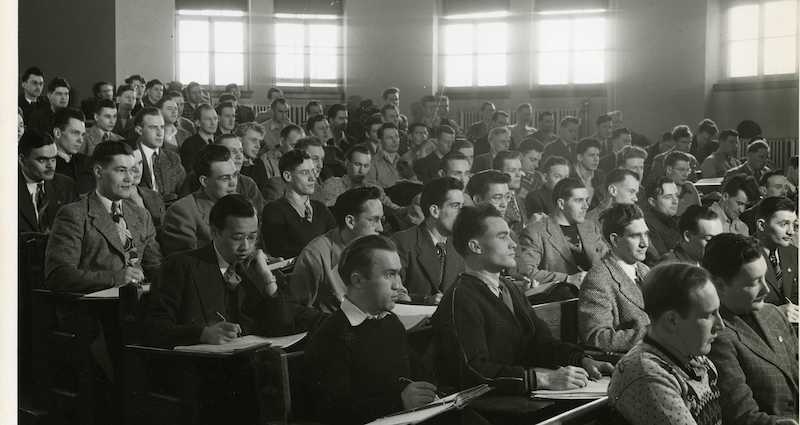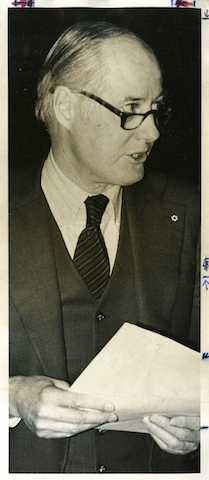
A University of Manitoba lecture hall from the time Henry Duckworth was a student. / Photo: UM Archives and Special Collections
Looking back at a previous Distinguished Alumni
As we prepare to celebrate five Distinguished Alumni at an inaugural and sure-to-be spectacular event on May 1, UM Today revisits a former winner of the Distinguished Alumni Award: Dr. Henry Duckworth. He made an indelible mark on our city and society. Dr. Henry Edmison Duckworth’s association with the University of Manitoba, going back more than 65 years, has been most significant. Since entering university in 1931 he distinguished himself in becoming the only person in the history of Manitoba universities to have had such a varied combination of participation in academic life: student, multiple graduate, professor, vice-president (academic), president, professor emeritus and, lastly, chancellor of the University of Manitoba.He received the Distinguished Alumni Award in 1961.
His early years
Born in Brandon, Manitoba on November 1, 1915, Duckworth was the only child of Ann Hutton (nee Edmison) and the Rev. Henry Bruce Duckworth, D.D. He grew up in the communities which his father served. When Henry Jr. was eleven the family moved from his father’s ministry in Transcona to St. James in 1926, the year after church union. Henry Jr. recalled that the only period when he was not in school was the first seven years of his life. He attended elementary schools in Transcona and St. James and graduated from St. James Collegiate. He entered university in September 1931, attending classes at United and Wesley Colleges. While he no longer had his paper route, he remained for some time as cub pack leader for the young People’s Society and as a member of a tennis club. Aside from his studies and community service, Duckworth was much involved in United College athletics: secretary of the athletic council, guard on the junior ‘b’ basketball team and captain of the college’s senior football team in 1935.
His academic life
He earned his B.A. in 1935, his B.Sc. in 1936 and a School of Education teaching certificate in 1937, all from the University of Manitoba. In 1937 he represented the education class on the University of Manitoba Students’ Union (UMSU) executive and on the Inter-Faculty Athletic Council. Duckworth taught secondary school mathematics at Stonewall Collegiate (Manitoba) for a year until 1938 when, at not yet twenty-three years of age, he became a lecturer in physics at United College (later to become the University of Winnipeg). After teaching for three years, he entered the University of Chicago on a University Fellowship as a Ph.D. candidate and earned his doctorate in physics in 1942. Later that year on November 21, he and Katherine Jane McPherson were married in Ottawa. She had graduated with a Bachelor of Science in Home Economics from the University of Manitoba the previous year, having been a prize and scholarship winner throughout her university years. Dr. Duckworth first saw his future wife in his father’s church, St. Andrew’s Elgin Avenue United, where the young dietitian sang in the choir. It was also in that very church that Katherine’s parents had met and were later married in 1895. During World War II, Henry and Katherine brought their newborn son Henry William (Harry) to be baptized at St. Andrew’s by his grandfather. The period of study for his Ph.D. was followed by three years as a defense research scientist in radar and atomic energy during World War II for the National Research Council of Canada (1942-1944 in Ottawa as junior scientist and 1944-1945 in Hamilton as assistant research physicist). Duckworth enlisted in the ranks for the Royal Canadian Signal Corps but was transferred to civilian duty in the radio laboratory of the NRCC as part of the Canadian radar program and later, the British-Canadian nuclear program. Duckworth’s interest in the highly specialized field of mass spectroscopy began in 1940 in the laboratory of Arthur Dempster, an eminent expatriate Canadian who was his dissertation advisor.
Duckworth became a pioneer in nuclear physics for his notable and numerous contributions in predicting energies released in the process of nuclear transmutation and discovering the rare stable isotope of platinum–mass 190 (then the rarest and lightest know). While with the National Research Council at Ottawa, Duckworth assembled the first mass spectrograph ever erected in Canada.
In order to accurately predict nuclear transmutation energies, Duckworth improved the quality of the mass spectrometer which then facilitated the possibility that “high precision” determinations could be made of the atomic masses of molecules. Through this work he learned the breakthrough evidence that some sudden charges occurring as atoms subsequently merge to form molecules. Duckworth was appointed assistant professor of physics at the University of Manitoba (1945-1946) and subsequently associate professor of physics and director of nuclear research at Wesleyan University in Middletown, Connecticut from 1946-1951 and professor of physics at McMaster University from 1951-1965. During his last four years at McMaster, Duckworth served as Chairman of the Physics Department and of Graduate Studies. He returned to the University of Manitoba on July 1, 1965, first as Vice-President (Development), and one year later, becoming Vice-President (Academic), a position he held for the following six years.
Memberships and awards
Duckworth’s professional contributions are legion. He has held long-time memberships in the Royal Society of Canada (Fellow, 1954; Tory Medal, 1965; President, 1971-1972), in the Canadian Association of Physicists (President, 1960-1961; C.A.P. Medal of Achievement, 1964) and is a Fellow of the American Physical Society. As well, he served as a member of the executive and Council of the Association of Commonwealth Universities (chair, 1977-1980; member, 1977-1979), of the Canadian Environmental Advisory Council (1973-1976), of the Science Council of Canada (1973-1977), of the National Library Advisory Board (1974-1979) and of the Association of Universities and Colleges of Canada (President, 1976-1977). In 1976 Duckworth received Canada’s highest civilian honour — The Order of Canada, from Governor-General Jules Leger. Duckworth has also received ten honourary degrees: United College/University of Winnipeg (Fellow, 1966), University of Ottawa (D.Sc., 1966), McMaster University (D.Sc., 1969), Université Laval (D.Sc., 1979), Mount Allison University (D.Sc., 1971), University of New Brunswick (D.Sc., 1972), Queen’s University (D.Sc., 1978), University of Western Ontario (D.Sc., 1979), Brandon University (D.Sc., 1982) and University of Winnipeg (LL.D., 1984). He was also the recipient of the Nuttfield Foundation Traveling Fellowship (1955). Duckworth was honoured, too, by his birth province, with The Order of the Buffalo Hunt in 1992. The University of Manitoba has awarded him the University of Manitoba Alumni Jubilee Award (1961), an Honourary Doctor of Laws (1978) followed by the designation Professor Emeritus of Physics (1983) and the University of Manitoba Distinguished Service Medal (1992).








Climate resilience …